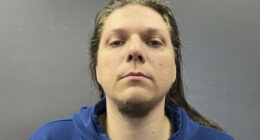Share this @internewscast.com

A Southwest Airlines pilot was dismissed after not passing a field sobriety test shortly before a scheduled flight from Savannah/Hilton Head International Airport earlier this year.
Recently released video footage by airport authorities shows the pilot undergoing a field sobriety assessment on the jetway. The footage captures airport police detaining the pilot after an officer noted indicators of what he described as being “consistent with DUI.”
Southwest Airlines stated that the pilot was promptly taken off duty following the incident and is no longer with the airline. “The safety of our Customers and Employees is of utmost importance to Southwest,” a spokesperson communicated in a statement to Nexstar.
Even if a pilot suspected of intoxication clears a field sobriety test, it’s likely they would still be barred from flying. The Code of Federal Regulations mandates several sobriety standards for pilots to ensure safe aircraft operation.
According to FAA regulations, pilots are not allowed to fly a civil aircraft (1) within eight hours after consuming alcohol; (2) while impaired by alcohol; (3) while using any drugs affecting their abilities against safety standards, or (4) with a blood or breath alcohol content of 0.04 or higher.
An FAA representative confirmed that pilots must meet all these conditions before operating a civil aircraft. For example, a pilot with a blood-alcohol level of 0.01 who drank alcohol less than eight hours prior would still be deemed unfit for flying duties.
The consequences for violating the above requirements can result in arrest, suspension or permanent revocation of a pilot’s license, among other penalties. Employers are also instructed to “permanently preclude” offenders from performing their previous “safety-sensitive duties.”
If a pilot should meet the above sobriety requirements, but is nevertheless found to have a blood-alcohol concentration greater than 0.02, they must still be removed from performing safety-sensitive functions (e.g., operating a plane) until they are considered more fit to do so, according to federal regulations.
The rules outlined in the Code of Federal Regulations are also considered by the FAA to be the “minimum” requirements concerning alcohol.
“Ideally, total avoidance of alcohol should be a key element observed by every pilot in planning or accomplishing a flight,” the FAA writes in its Alcohol and Flying Brochure.
The agency also recommends that pilots do not drink alcoholic beverages in the 24 hours before flying.
“This is especially true if intoxication occurred or if you plan to fly [Instrument Flight Rules],” the brochure reads.
The Southwest pilot who was taken into custody in Georgia, meanwhile, has since denied he was under the influence of alcohol during his arrest. His lawyer, speaking with The Independent last week, has alleged that officers administered the sobriety tests incorrectly and that the pilot had “committed no crime.”
A representative for the Savannah/Hilton Head International Airport did not return a request for further information. A spokesperson for Southwest Airlines was unable to comment on legal matters.











